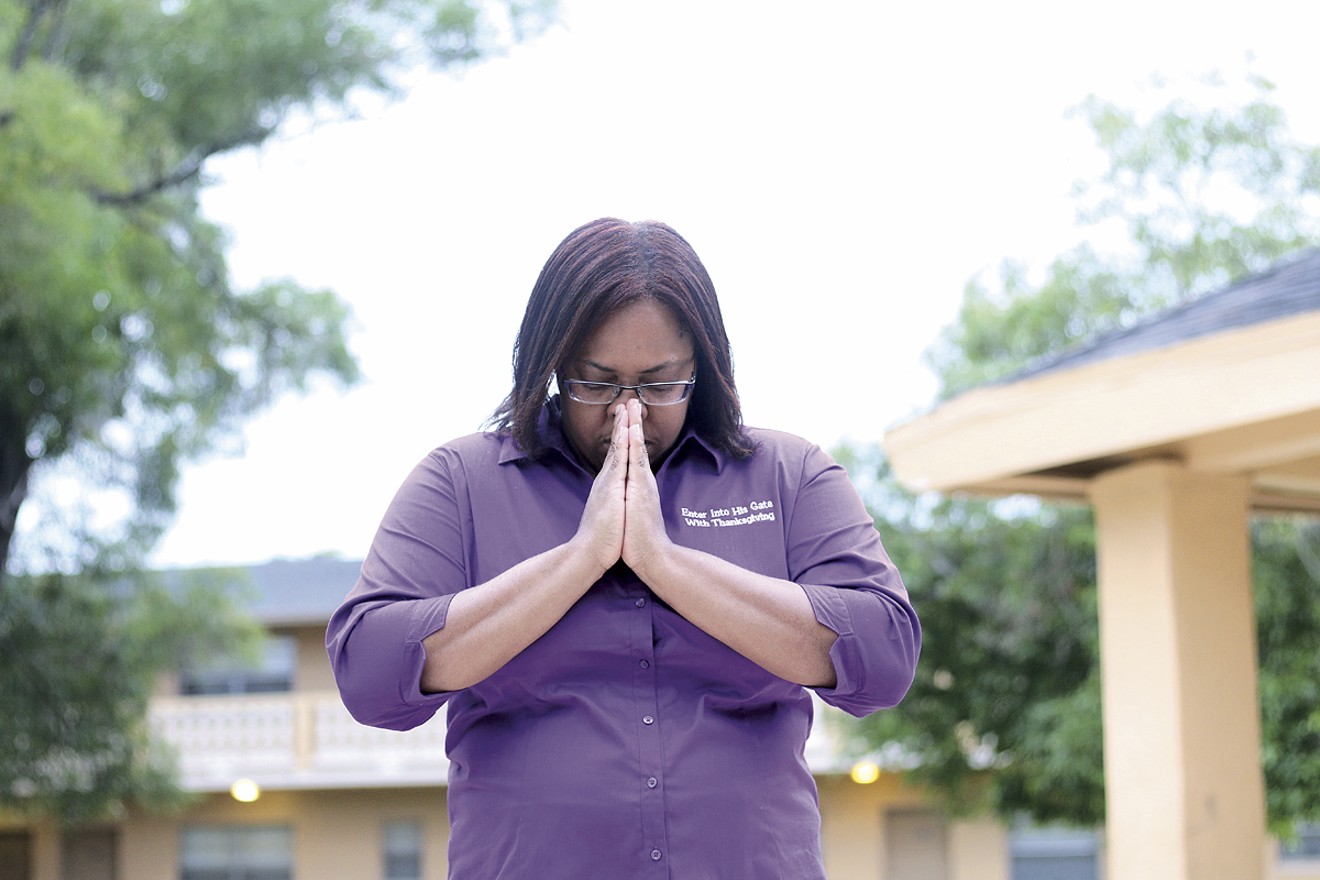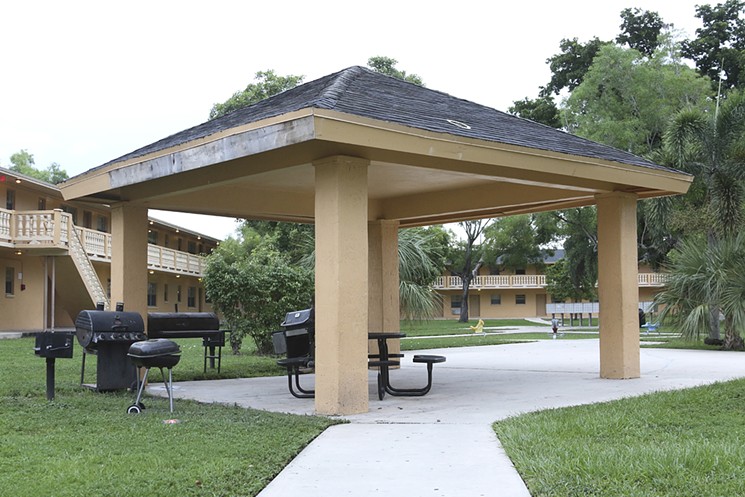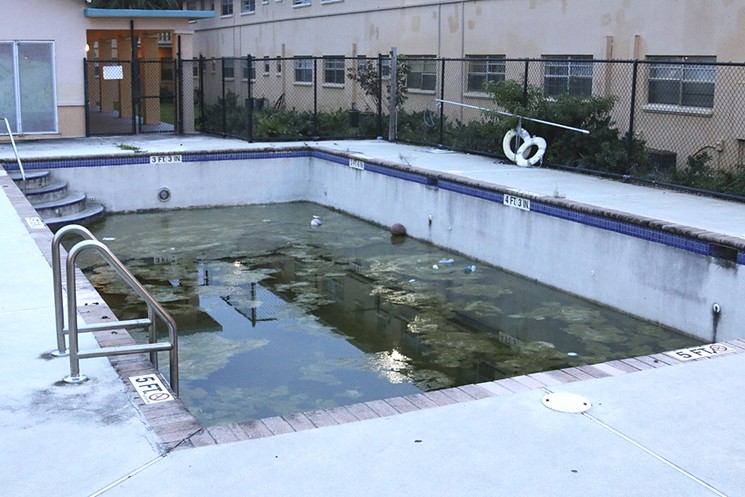On a Saturday morning in 2013, Shalonda Rivers woke up early, ate a breakfast of microwaved oatmeal, and put a mop to her linoleum floor. It was the first step in her weekend cleaning routine, an ongoing battle against grime, pests, and mold that began when she moved into the two-bedroom, one-bathroom apartment in Opa-locka's Cordoba Courts apartments in 2001.
The single mother of four's walls
As Rivers set to work, humming along to a Jermaine Dolly gospel song on her TV, she moved into the hallway, next to the relic of a gas heater that was set into her wall. Suddenly, the tall 41-year-old, who keeps her reddish-brown hair pulled back, saw something out of the corner of her eye. She looked more closely at the heater, gasped, and chucked her mop to the floor. Wriggling their way out of the vertical vents, dropping to the floor, were "thousands of maggots," Rivers remembers.
"I was like, What in the world?" she says. "We're plagued."
Hysterical, Rivers dialed the emergency hotline number property management had given tenants. But because it was Saturday, no one was around to answer her calls. To stop the flow of the maggots, she asked one of her sons to rip up old newspapers so she could stuff them into the vents. But the tiny, worm-like creatures found their way around the newsprint and continued to drip onto her floor.
At church the next morning, Rivers prayed to forget the sight. Lord, give me strength, she thought. That Monday, she left the apartment with her children at 7:30 a.m. to drop them off at school. Thirty minutes later, she returned home and stormed into the management office, right across the sidewalk from her front door. She demanded someone come to her apartment immediately to stem the tide of larvae.
Soon a maintenance worker removed the heater, and the emergency ended, at least temporarily. "It was more than thousands of maggots," Rivers recalls. "You have to raise Cain and sand for them to make a move."
Rivers had experienced problems for years at Cordoba Courts, the tan-painted subsidized housing complex off NW 22nd Avenue, just north of Opa-locka Boulevard. In 2008, she discovered mold in her unit. A few years later came water leaks that sounded like rain. "Living in low income," Rivers says, she didn't expect much. But she took her four kids — James, now 21; Ja-Shon, 18; Precious, 11; and Joanna, 5 — to church every Sunday morning and to Bible study every Wednesday evening. She believed that children of God deserve to live with dignity.
So a few weeks after the maggot onslaught, she posted a notice on every resident's door calling a meeting to form a tenants' association. Nearly half the complex met her under the gazebo in the middle of Cordoba's grassy courtyard, she recalls. They shared complaints about rats, roaches, mold, and water leaks and then elected Rivers association president. She vowed to advocate for better conditions. "A lot of people in life, they tend to give in easily," she says. "I consider myself more of a fighter."
As pressure for change grew, Cordoba was sold in 2016 to Millennia Housing Management, a real-estate company based in Cleveland that owns and operates thousands of units across the nation. The cost: $11 million. Millennia replaced the roof, resealed the parking lot, installed new washing machines, and placed a bench and a garden of birds of paradise in front of the rental office.
But tenants say improvements didn't go far enough. Two years later, in 2018, Rivers and about a dozen others interviewed by New Times say the conditions that caused them to form the tenants' association were never treated with much more than a coat of paint. "We are gonna stand up for our rights and make our units as they're supposed to be," Rivers says, "safe, decent, and sanitary."
Cordoba is not unique: Residents of government-subsidized, Millennia-owned properties across the nation have complained of neglected infrastructure and mismanagement, according to media reports. Early this summer in Kansas City, a ceiling in a Millennia-owned apartment fell on a girl on her 16th birthday; she survived after being rushed to the hospital. In West Palm Beach, where residents of Millennia's Stonybrook Apartments were living in condemned units over the summer, five babies have allegedly been treated in local hospitals for breathing problems due to poor air quality. In Memphis, Troy Darnell Fleming sued Millennia after he contracted Legionnaires' disease, a severe form of pneumonia the 55-year-old says was caused by bacteria festering in his A/C unit. According to the complaint, his doctors advised him to move out of the apartments. But like many Millennia tenants, Fleming had nowhere else to go. (In a statement in response to the lawsuit, Millennia wrote that it took Fleming's complaint "very seriously" and intended to investigate his allegations.)
Last summer, Cordoba failed an annual inspection by the U.S. Department of Housing and Urban Development. Inspectors cited 41 health and safety violations, including broken fire alarms, holes in walls, mold and mildew, missing doors, and exposed electrical wires. After initially failing inspection again in 2018, the complex barely passed after Millennia appealed the report. HUD has since required the company to inspect every unit; Millennia has vowed to remove all the mold, fix the security gate, paint the building, and repair the pool. "We invested in improving the property as soon as we bought it, made significant progress early on toward that goal," says Laurie Roberts, a Millennia spokesperson. "[And we] still continue to make updates."
But residents are wary. "It's hell. That's it — I can't give you no other words," says Alicia Davis, who has lived at Cordoba Courts for three years with her asthmatic 5-year-old son. "I can't tell you nothing else. Just hell."

Less than a year after it acquired Cordoba, Millennia purchased Key Tower, a granite-and-steel skyscraper that looms over downtown Cleveland and Lake Erie, for $267 million. At 57 stories, it is the tallest building in Ohio. CEO Frank Sinito's office is on the 13th floor.
Sinito, a clean-cut middle-aged man with a toothy smile, got his start in business in 1985 after working his way through Cleveland State University as a bartender. After graduating with a degree in economics, he purchased his first complex, a 14-unit apartment building for people with disabilities in a Cleveland suburb. "I loved the social mission of it and decided this is what I wanted to pursue," Sinito last year told La Gazzetta Italiana, an Italian-American-oriented online newspaper in Ohio.
Over the next decade, Sinito expanded his portfolio across Ohio and the Midwest, acquiring about 1,000 units. "It was just me, me, and me," he said at a recent city council meeting in Riviera Beach. "I was the property manager, the regional manager, the maintenance tech guy. I pretty much did it all."
In 1995, Sinito's work paid off, and he incorporated the Millennia Companies to oversee his affordable-housing and market-rate properties, a restaurant he owns with his wife, and two skyscrapers in downtown Cleveland including Key Tower. "The passion never left me for providing a house for the least of the least," Sinito told La Gazzetta. "Millennia prides itself on elevating the standard of Section 8 housing. I always ask myself, 'Would I live in the apartment homes I've created?'"
Sinito has had to overcome a difficult past. His whole adult life had been spent struggling to maintain a relationship with his father, Thomas, who died of a heart attack in the yard of Belmont Correctional Institution, a state prison in Ohio, two years after Millennia was incorporated. Thomas had been incarcerated on more than 70 counts of racketeering and possession of marijuana and cocaine with intent to distribute. A years-long FBI investigation into a Cleveland crime family led to the bust.
After the death, the state sent Sinito a box of his father's possessions. Inside were a pair of worn-out running shoes and a dog-eared copy of the Bible. Sinito opened the tome, and as he "began reading his father's copy of the Word of God, reading the notes in the margins and allowing the Holy Spirit to penetrate his heart, he surrendered his own life to Jesus Christ," according to his biography on the website of True Freedom, a nonprofit prison ministry he founded in 2005. Millennia also offers religious services on many of its properties.
"Millennia prides itself on elevating the standard of Section 8 housing."
tweet this
Today, Millennia owns and operates more than 28,000 units of affordable and market-rate housing nationwide, which was mostly acquired in the 2000s. Tom Mignogna, the company's development manager, says Millennia differs from other real-estate firms in that "we tackle the most challenging properties in the country." Through its sister firm, American Preservation Builders, Millennia acquires complexes with the aid of a federal tax credit for building affordable housing.
"Since 2014 alone, Millennia has preserved (or is in the process of preserving) more than 4,000 affordable-housing units for low-income residents," Roberts, the company's spokesperson, wrote to New Times in response to emailed questions.
Among the challenging
The feds recruited Millennia in 2016 to take over Global Ministries' portfolio of about 60 complexes across the nation, including Stonybrook Apartments in Riviera Beach, where residents have voiced complaints similar to those at Cordoba.
"What bothers me most about what we're experiencing is I didn't ask for this," Sinito said at a recent Riviera Beach city council meeting concerning the property. "I was recruited to buy the GMF portfolio. When I look at it now, I regret it."
Millennia is still in the process of that deal, but it owns Cordoba Courts outright. Tenants of the project-based subsidized housing pay 30 percent of income in rent, and owners collect the rest as a subsidy from the federal government. If tenants move out, they can't take the subsidy with them.
When Shalonda Rivers, who found the maggots in her heater, moved into Cordoba in 2001, there was no gazebo, no central A/C, and no paved concrete, she says. The complex was built in 1970 as part of a wave of affordable-housing construction. Its former landlord, Miami Property Group, made some capital improvements in 2006 but didn't invest enough money to keep the aging building up to code.
By the time Millennia acquired Cordoba in 2016, problems had become severe. T+S Roofing Systems, a Bird Road company, was called on to do repair work. "The roof... was neglected," co-owner Louis Toledo says. "The units must have been having leaks for years on end."
But Millennia didn't undertake an accompanying renovation of the apartments' interiors. "The three-quarters-of-a-million-dollars-worth of improvements we made were not intended to comply with codes," Roberts wrote to New Times. "Rather, they were made to make the property more inviting and make people proud to call Cordoba Courts home."
A week before Christmas 2017, Myra Morrison was packing her bags. There was a lot the 39-year-old hoped to take when she left her two-bedroom apartment in Cordoba: her son's green, red, and white onesie; his baby pictures; and his little-league baseball gloves. But they had been ruined by the mold that had taken over her apartment.
"Those are memories I can never get back," Morrison says.
She says she alerted the property manager six times in nine months about the mold, which originated from a leak behind the bathtub that was so bad water would seep through the hallway and into the living room. After maintenance workers tore out her tub to locate the leak's source, they found a pipe had rusted and burst. They patched it, but by then, the mold had taken root.
Morrison, a school bus driver, says management promised the mold would go away if she washed her walls with bleach and water. But it spread, curling the edges of her son's baby pictures and, ultimately, forcing her to leave.
So on December 18, she moved in with her ex-husband. If Morrison wants to return to a subsidized apartment, she will have to place her name on Miami's years-long waiting list.
"You come home from work and you have to deal with the smell, the dripping water, the buckets in your bathroom," Morrison says. "I had little white mushrooms growing out of my ceiling."
The apartment doors at Cordoba Courts face each other across a grassy courtyard that's empty aside from a few skinny oak trees, some benches, and the gazebo that was installed in 2006.
Shirley Kemp, a 67-year-old who lives alone and wears green curlers in her hair, says a mouse bit her foot this past November as she watched Law & Order: Special Victims Unit. The rodent scurried away before she could get a good look at it. The next day, she hurried to a local doctor, who gave her an antibiotic for her swollen foot.
Daniels lifts the bedsheets and points to a hole in the wall that's big enough for a rat.
tweet this
After returning home, Kemp still had to deal with termites in her door frame and roaches scuttling over her counter. "I was terrified," she says. "I didn't want to stay in the apartment anymore."
One of the worst units is 104. Inside the dim residence, the air is thick with mildew. The A/C unit drips into a white bucket. In the kitchen, 16-year-old Chardonnay Daniels peels back the black-and-white checked wallpaper covering the counters to reveal cracked linoleum underneath. Nearly all of the bottom cabinets are missing doors.
Daniels says her family moved into the apartment two years ago when her grandmother, 70-year-old Gloria Wesley, needed a place to stay. Wesley, who is a widow, requires a walker because of arthritis in her legs and has been in and out of the hospital the past couple of years. Managers assured the family they could accommodate Wesley, Daniels says. The family thought a walk-in shower, bathroom handrail, and wheelchair ramp would be ready when she began living there.
But on move-in day, Daniels says, the work hadn't been completed. Though the property manager assured the family it would be done, Wesley is still awaiting a wheelchair ramp that would allow her to go outside without her grandchildren's help. She spends most of her time watching movies on a queen-size bed. She says she has been too terrified to go anywhere else in the apartment after seeing a rat scurry across her living room last year. And she worries about her young grandchildren breathing in mold.
"We're paying our rent, and we still haven't been satisfied," Daniels says as she lifts the bedsheets in her brother's room and points to a hole in the wall that's big enough for a rat. "We pay on time every month, and we still haven't been satisfied."
Two other residents — 44-year-old Tara McDonald and 60-year-old Mary Ramsay — say they have requested disability accommodations but never received them. Ramsay says she has asked management multiple times if she can move to the ground floor because two slipped discs in her back caused by a bus accident make it difficult for her to climb stairs.
McDonald has used a wheelchair since surgery nearly two years ago. Though she was moved to the first floor a year and
Millennia spokesperson Laurie Roberts wrote in a response to emailed questions about Daniels, Ramsay, and McDonald that the company's policies comply with Fair Housing Laws and that she would need to verify if the three residents submitted accommodation forms. Rafael Scott, whom Millennia hired to manage Cordoba earlier this summer, says he received a form from McDonald in early August and is working to find a ramp for her unit.
Fourteen residents interviewed by New Times complained management doesn't take their concerns seriously. They contend it sometimes takes the maintenance staff weeks or even months to respond to work orders or repair requests. According to Gloria Shanahan, a HUD public affairs officer, between this past July 1 and August 10, Millennia had 52 open work orders for issues such as broken appliances and A/C units, wall and ceiling damage, and busted windows.
"The company's goal is to provide maintenance/repairs within 24 to 48 hours after a tenant submission, with a priority placed on repairs that involve health and safety," Roberts wrote New Times.
She also wrote that in the two years Millennia has owned the property, it has invested more than $1 million in ongoing maintenance. (That amount is about 20 percent of the company's annual federal subsidy.)
Some tenants say if they push too hard, management slaps them with eviction orders. Tabitha Bullard, who had lived at Cordoba for at least a year, went to court in July 2016 after Millennia tried to evict her for not paying rent. The case was ultimately dismissed. In her answer, Bullard wrote on a sheet of printer paper: "The windows in the apartment are still broking [sic] and the landlord refuse [sic] to fix them."
In May 2017, another resident, Tamara Perry, who lived at Cordoba with her son Jaquain, wrote in her answer to an eviction complaint: "The landlord is retaliating due to the numerous verbal requests for repairs to my apartment." Perry's eviction was also dismissed. Of the 24 eviction cases listed in court records, 17 were dismissed or settled between the apartment company and the tenants. Millennia responds that management files for eviction to enforce the lease and often settles, resulting in dismissal.
Opa-locka has cited Millennia for code violations nine times since it took over the apartments in 2016 for infractions such as broken lights or raw sewage. The city's most recent inspection, conducted this past July, cited incomplete repairs, drywall that had holes, leaking A/C units, and a dead rat found on a glue trap behind a stove. Failure to maintain the complex would result in the revocation of Millennia's occupational license and landlord permits, Esin Daniel Abia, director of building and licensing for the City of Opa-locka, wrote in the report.
In December 2015, Millennia was cited for mold and hit with a running fine of $300 per day. But the fine wasn't enforced until February 2018, according to a special master's final ruling dated this past January 16. The fine totaled $64,111.56 as of August 17, according to an email from Opa-locka Police Chief James Dobson.
Millennia has no record of the fine, according to Roberts. "The original order [from the city] covered specific instances, which were resolved," she wrote. "As to the new instance of... an ongoing fine, the company was never allowed due process in that matter... It appears the City made a sweeping determination, without allowing Millennia to present its case, or even be notified. How is that even possible?"
Asked about the discrepancy, Wilma Wilcox, director of code enforcement for Opa-locka, was insistent the fine is still in place. "I'm sure that the new manager knows about it — it's gonna force his hand to get these units into compliance," she says. "At the end of the day, they must pay the city for not being in compliance this whole time... It doesn't go away just because they fix it. This is a lesson going forward to force them to take it seriously."
Shalonda Rivers grew up in a strict religious household in Miami Gardens, where her parents, Gladys and JB, enforced a curfew and forbid their daughters from wearing pants. One of seven children — four boys and three girls — she recalls horsing around in the backyard and biking with the neighborhood kids to the park at the end of the street.
Gladys regularly prepared dinnertime meals of collard greens, cornbread, fried chicken, lima beans, and squash. No one could approach the table, Rivers says, until her father began to eat. On weekends, Rivers was required to sweep, fold laundry, and wash dishes. "My mom felt that me being a girl, I should take on more responsibilities," Rivers says. "The boys, I feel, got away with a little bit more."
Every Sunday, the family attended church services that began with 30 minutes of silent prayer and continued with a half-hour of joyous clapping and singing from a hymn book. "We took the Bible, and we turned it into songs," she remembers, adding that she saw miracles. People would enter the church with crutches and leave "without the crutches, and we would put the crutches up on the wall."
Rivers attended Miami Dade College after graduating from high school, but she had to drop out after having her first child, James. She was then 19 years old. "We didn't have the luxury of knowing the seriousness of going to college and getting an education," she says. "We knew to graduate from high school... but it [wasn't] explained to us in detail."
After a few years of raising Ja-Shon at her parents' home, Rivers decided to move out. She took courses at a vocational college and began doing clerical work at Jackson Memorial Hospital. In 2001, she applied to live at Cordoba, she says, because she knew a single parent without a college degree would always struggle to make ends meet. "I knew I had to be responsible," she says. "I knew I had to raise my child."
Now 39 years old, Rivers still attends church every Sunday for prayer and Wednesday nights for Bible study. Her favorite story is David and Goliath. Religion has equipped her to advocate for better living conditions, she says. "I wouldn't have the mindset I have if I wasn't raised in a church. I won't give up easily, especially when I know something is wrong."
After forming the tenants' association in 2013, she quickly concluded that most who lived at Cordoba didn't know their rights — many who received eviction notices simply left, unaware they could contest them. At meetings, she distributed a list of contacts such as Legal Services of Greater Miami, which represents tenants pro bono.
"It's about point-blank what's right and what's wrong — simple."
tweet this
Tenants began approaching Rivers when issues arose. On her phone and computer are thousands of pictures of rusted pipes, water leaks, mold, and dead pests that her neighbors have sent her. She often delivers disabled tenants' rent checks to management. "They look down on us," Rivers says. "When people have riches or luxury, they think because we're living in low income that we're nobody."
Michael Kane, the director of the National Alliance for HUD Tenants, an organized network of more than 300 tenants' associations across the nation, says Rivers has worked hard for her neighbors. "She's had to spend years fighting," he says. "Everybody let her down. No one did what they're supposed to do."
Rivers believes she faced retaliation from management for her work as the president of the residents' council. She's still fighting an eviction notice she received earlier this year. Millennia maintains she violated her lease agreement by twice refusing to allow inspectors into her apartment during a nine-month period. Rivers responds that her son, who was age 17 at the time, simply told inspectors that his mother wasn't home. In a countersuit filed against Millennia this past June 6, Rivers claims the landlord failed to maintain her unit and improperly searched her personal belongings. (Millennia denies the allegations.)
Despite the controversy, Rivers believes her strategy is working. Federal authorities, including representatives of Congresswoman Frederica Wilson, have toured the property, and Millennia recently hired a new property manager. The company has vowed to inspect every unit for mold, remediate when necessary, and make more capital improvements, including fixing a broken security gate and the swimming pool.
In mid-August, Millennia CEO Frank Sinito visited Cordoba. Rivers showed him her unit while her 5-year-old daughter Joanna ate pizza at the dinner table. They looked at holes in the wall that she's filled with steel scouring pads to ward off rats, cracks in her bathroom ceiling that threaten collapse, and mildew around her bathtub.
At the end of the tour, Sinito, dressed in a mint-green button-down shirt and chinos, vowed to fix the problems. "Anything that needs repair we'll get repaired," he told Rivers. "Promise."
Millennia has posted notices on residents' doors notifying them of work scheduled over the next 60 days. A week ago, Millennia moved Rivers and her four kids to a hotel while her unit is being repaired. She is waiting to return to see if the conditions are better.
She believes that had she not prayed to God to lean on "the righteous side," she might not be seeing a difference today.
"It's about point-blank what's right and what's wrong — simple," Rivers says. "I want my apartment fixed; other residents want their apartments fixed. It doesn't matter how many repairmen you bring in — until it's fixed, I'm gonna say the same. I'm gonna shout it from the mountaintop."
Correction: An earlier version of this story incorrectly cited a $600,000 penalty levied against Global Ministries Foundation. That citation has been removed.














